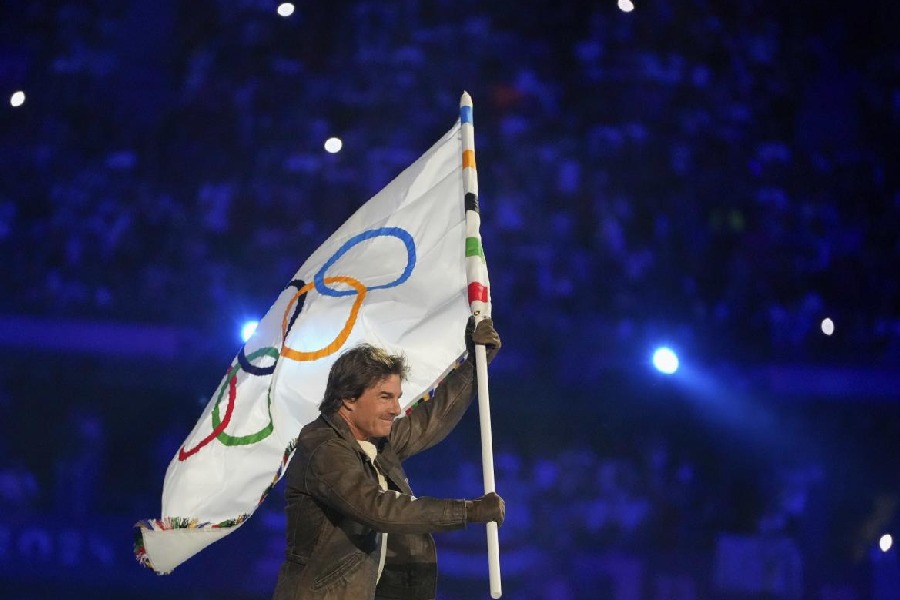The idea of leaving the surface of the earth below took flight in Paris. In 1783, brothers Joseph-Michel and Jacques-Étienne Montgolfier demonstrated their invention, the hot air balloon, before a crowd of dignitaries in Annonay by the River Rhone.
And Paris had been flying high for the past 16 days. The Olympics cauldron balloon, inspired by the feat of the Montgolfier brothers, had flown through the air, dazzling the crowds soaking in the biggest sporting carnival on Earth.
Paris might have said goodbye to the 2024 Olympic Games, but the memories will linger. Memories that began from July 26 — the rain-drenched opening ceremony; the genius of Simone Biles as she stormed back with four medals after her mental battle with “twisties”; Noah Lyles’s face as he realised he had won the 100 metres dash beating Kishane Thompson by five-thousandths of a second in 9.79; the roar and the hush as Mondo Duplantis beat
his own pole vault world record for the ninth time in a moment of great theatre at the Stade de France.
And the wonder Gustave Eiffel built and Alberto Santos-Dumont flew over in his dirigible in 1901. The metal structure’s intricacies remind one of the Howrah Bridge. The Eiffel Tower is ubiquitous, offering a new angle every time, lit up at night, the Olympic rings made by ArcelorMittal and installed between the first and second floors making the structure an integral part of the Games like the Tower Bridge for London 2012, Madureira Park in Rio (2016) and Odaiba Beach for Tokyo 2020.
Over 9.5 out of 10 million tickets were sold as 145,000 spectators from all over the world gathered in 743 fan zones. Around 2,250 people gathered along the River Seine for the opening ceremony. Nearly one million people poured onto the streets to watch
the two Olympic road cyc-
ling races.
“It was a fantastic Games. There was a lot of pessimism about how the Olympic Games would pan out for the country. But Paris exceeded all expectations. It was inclusive as we saw during the opening ceremony when Jamel Debbouze passed the baton of the Olympic flame to Zinedine Zidane,” Simon Kuper, author of Impossible City: Paris in the Twenty-First Century, told The Telegraph.
The Paris Games was inclusive in every sense. There was immense negativity in the build-up. The quality of the water in the Seine; the fear of terror attacks that got traction after France’s high-speed rail network was hit by several “malicious acts” hours before the opening ceremony, and a general scepticism about whether the French would be able to pull it off. But they did, as Parisians and the thousands who came in droves refuse to let go of the magic.
“Together, we have experienced the Games like nothing we have ever lived before,” said Tony Estanguet, the president of the Paris Olympics organising committee, adding that of all the records broken, among them was one for marriage proposals. “From
one day to the next, time stood still and a whole country got goose bumps.”
French President Emmanuel Macron said the Olympic Games showed the world the true face of France as
he praised the success of Paris 2024. “We don’t want life to get back to normal,” Macron said at a reception at the Elysee Palace.
Parisians are unwilling to let go of the sense of time deliciously suspended.
“It is the best feeling Parisians have had since France hosted (and won) the 1998 World Cup,” Kuper, now a naturalised French citizen after staying in Paris for the last 20 years, said.
Of course, the final accounting on all fronts will take months. But the economic boom that many expected probably did not happen. “Before the Games, the idea was being sold that Paris would see an economic boom. But it did not happen. Paris is the summer destination in Europe but this year most tourists avoided coming here because of the Games. That was something everyone complained about. With the organising committee deciding to give 50 per cent of the tickets to the French people, restaurants did not do the usual summer business. Parisians will never go to the bistros because it’s expensive for them,” Kuper said.
Paris took great lengths to make the sporting events the most sustainable ever. Cleaning the Seine was the most symbolic part of Paris’s promise to massively green the Games, cutting carbon emissions and plastic use in half from past events.
The heat, though, was unbearable. Athletes suffered cramps because of the heat — India and the US were the few countries that installed portable air conditioners in their areas. “It was bad during the cycling event of the triathlon,” a Parisian said.
But the legacy of the Games would outlast these minor quibbles. The benefits will be many, not least for Saint-Denis, the sprawling suburb that is synonymous in France with poverty, immigration and crime.
It houses the aquatic centre, one of only two permanent sports buildings erected for the Games, which will open as a community centre. The Games village with its
40 buildings, also built here, will become home to some 6,000 people.
The city of ideas, revolutions and class struggle, which has defined so much of European and world history, has delivered. Big time.











